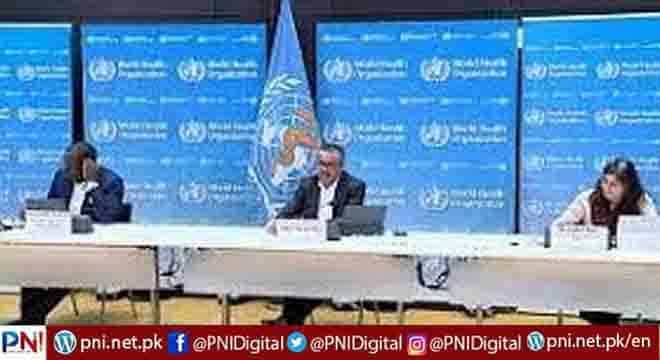UNITED NATIONS, Dec 30 (APP):The head of the World Health Organization (WHO) has warned the Omicron and Delta coronavirus variants could produce a “tsunami” of COVID-19 cases that will put “immense pressure” on healthcare systems.
“I’m highly concerned that Omicron, being more transmissible [and] circulating at the same time as Delta, is leading to a tsunami of cases,” WHO Director-General Tedros Adhanom Ghebreyesus said at an online news conference from Geneva on Wednesday.
Two years after the new coronavirus first emerged, top officials with the United Nations health agency have cautioned it was still too early to be reassured by initial data suggesting Omicron, the latest variant to be detected, led to milder disease.
First reported last month in Southern Africa, it is already the dominant variant in the United States and parts of Europe.
As 92 of the WHO’s 194 member countries missed a target to vaccinate 40 percent of their populations by the end of this year, Tedros urged everyone to make a “New Year’s resolution” to get behind a campaign to vaccinate 70 percent of countries’ populations by the beginning of July.
According to WHO’s figures, the number of COVID-19 cases recorded worldwide increased by 11 percent last week compared with the previous week, with nearly 4.99 million newly reported from December 20 to 26.
New cases in Europe – which accounted for more than half of the total – were up 3 percent, while in the Americas it rose by 39 percent and in Africa by 7 percent. The global gain followed a gradual increase since October.
Concerned over the rise in cases, the WHO chief said it would put “immense pressure on exhausted health workers and health systems of [on] the brink of collapse”.
WHO said in its weekly epidemiological report that the “overall risk” related to Omicron “remains very high”.
It cited “consistent evidence” that it has a growth advantage over the Delta variant.
It noted that a decline in case incidence had been seen in South Africa, and that early data from that country, the United Kingdom and Denmark suggest a reduced risk of hospitalisation with Omicron but said more data was needed.
WHO’s emergencies chief, Michael Ryan, underlined that note of caution. He said it would be important in the coming weeks to “suppress transmission of both variants to the minimum that we can”.
Ryan said Omicron infections began largely among young people.
“What we haven’t seen is the Omicron wave fully established in the broader population,” he said.
“And I’m a little nervous to make positive predictions until we see how well the vaccine protection is going to work in those older and more vulnerable populations.”
Tedros slammed the attitude of richer countries, accusing them of hogging the weapons to combat COVID-19 – and leaving the back door open for the virus.
“Populism, narrow nationalism and hoarding of health tools, including masks, therapeutics, diagnostics and vaccines, by a small number of countries, undermined equity, and created the ideal conditions for the emergence of new variants,” he said.
Meanwhile, he said disinformation had been a constant distraction in 2021, hampering efforts to beat the pandemic.
“In the huge waves of cases currently seen in Europe and in many countries around the world, misinformation which has driven vaccine hesitancy is now translating to the unvaccinated disproportionally dying,” he said.
Tedros lamented that while there were 1.8 million recorded deaths in 2020, it rose to 3.5 million in 2021; and the true number would be much higher.
But he said he remained “optimistic that [2022] can be the year we can not only end the acute stage of the pandemic, but we also chart a path to stronger health security”.
Follow the PNI Facebook page for the latest news and updates.









